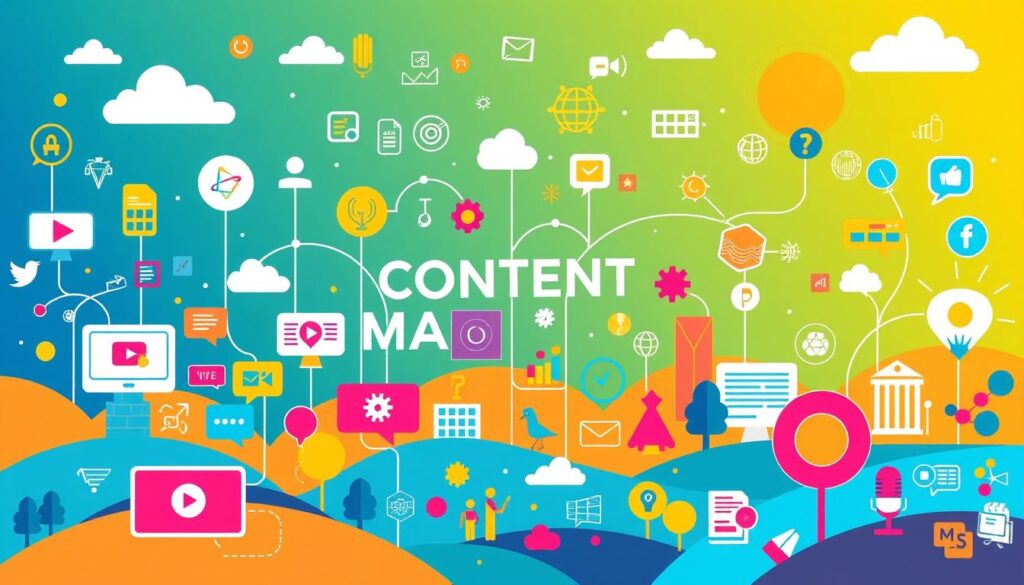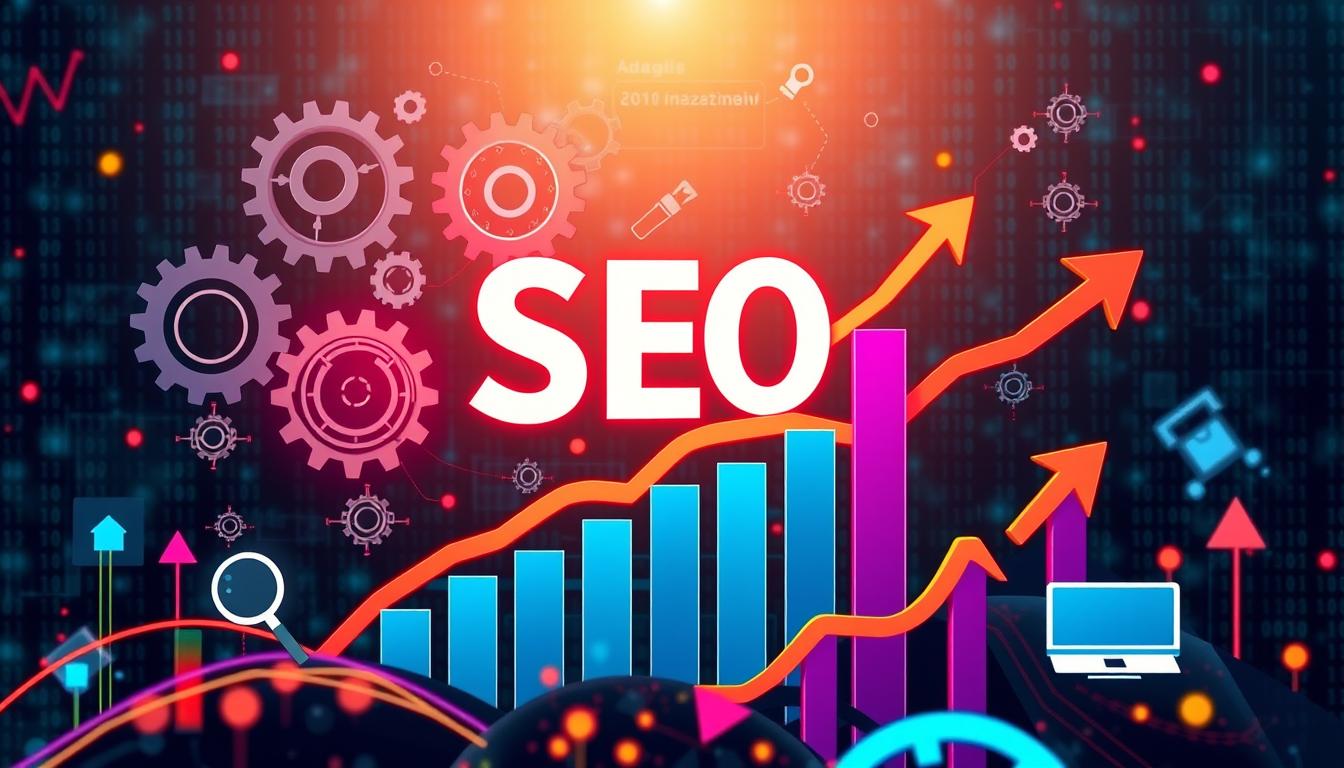As a business owner or marketing pro, I understand the need for a strong online presence today1. Digital marketing is key to connect with customers, keep them engaged, and boost sales. This guide will cover the basics of digital marketing, helping you succeed online1.
You’ll learn about digital marketing’s main parts, like creating content, using social media, SEO, and email marketing1. I’ll share effective ways to attract customers, turn them into loyal fans, and make the buying process easier1. Digital marketing might seem complex, but I’ll simplify it for you, offering a clear path to success.
2 Digital marketing is more than just online stuff; it’s about marketing in today’s digital world2. By using online tools and data, you can reach more people, improve your campaigns, and make smart choices for your business’s growth.
Key Takeaways
- Digital marketing is crucial for connecting with your audience in today’s digital world.
- This guide explores digital marketing’s core areas, including content, social media, SEO, and email marketing.
- Good digital marketing aims to raise awareness, convert leads, build loyalty, and shorten the buying process.
- Building a strong online presence helps you reach more people, refine your campaigns, and make informed decisions for growth.
- Digital marketing is not just about being online; it’s about marketing in today’s digital age, with solid principles for success.
What is Digital Marketing?
Digital marketing uses digital technologies to promote products or services online. It includes many tactics and strategies to reach customers through the internet. Key areas include SEO, PPC, social media, content, email, and mobile marketing.
Definition of Digital Marketing
Digital marketing promotes brands through digital channels like search engines and social media. It helps businesses connect with their audience in a more personal way than traditional methods34.
Importance in Today’s Business Landscape
In today’s world, digital marketing is key for any business34. It lets companies reach more people and target specific groups. Plus, it’s easy to see how well marketing works in real-time. Digital marketing is also flexible, allowing businesses to change their plans quickly.
Key Components of Digital Marketing
The main parts of digital marketing are:
- Search Engine Optimization (SEO): Making websites and content rank better in search results.
- Pay-Per-Click (PPC) Advertising: Paid ads on search engines and other digital places.
- Social Media Marketing: Using social media to connect with customers.
- Content Marketing: Creating content to attract and keep an audience.
- Email Marketing: Sending emails to help leads become customers.
- Mobile Marketing: Using mobile devices to reach consumers.
The Evolution of Digital Marketing
The marketing world has changed a lot, moving from old ways to digital marketing. This change came from how people behave and new tech5. Now, the marketing field uses new platforms and strategies to reach people online.
From Traditional to Digital
Before, marketing used print, TV, and mail. But the internet and digital devices changed everything6. Now, SEO, content, social media, and email are key. They help businesses talk to customers in a new way.
Major Milestones in Digital Marketing History
There have been big moments in digital marketing6. Web 2.0 made marketing more personal. Social media came next, letting businesses reach people in new ways6. Then, mobile devices changed everything, with most digital time spent on phones7.
Now, digital marketing is getting ready for Web 3.0, with virtual and augmented reality, and AI6. These new techs will change how businesses talk to customers, making marketing more personal and fun.
“The future of marketing is digital, and the future is now. Businesses that embrace the power of digital marketing will be poised for success in the ever-changing landscape of consumer behavior and technological innovation.”
Digital marketing has come a long way, always changing to meet consumer needs567. Marketers must keep up, using new tools to make campaigns that connect with people.
The Core Channels of Digital Marketing
Digital channels are key to success in today’s marketing world. They include SEO, PPC, social media, and content marketing. Together, they form a strong digital strategy that attracts audiences and drives results8.
Search Engine Optimization (SEO)
SEO boosts a business’s online presence and traffic. It improves website content and structure for better search rankings. This attracts more leads and customers8.
An SEO strategy involves keyword research and on-page optimization. It also includes off-page techniques like backlinks8.
Pay-Per-Click Advertising (PPC)
PPC ads on Google, Facebook, and TikTok drive targeted traffic. Businesses can create ads that appear in search results or social media feeds. This ensures their message reaches the right people at the right time9.
Social Media Marketing
Social media has changed how brands connect with their audience9. Platforms like Facebook and Instagram offer chances to build awareness and drive conversions. Businesses can use organic posts, paid ads, and influencer marketing9.
Content Marketing
Content marketing creates and shares valuable content to attract and keep an audience8. It includes blog posts, videos, and infographics. It’s vital for building brand authority and improving SEO8.
Effective content marketing starts with knowing your audience. It involves choosing the right content formats and analyzing competitors. This helps identify opportunities8.
By using these digital marketing channels, businesses can create a strong strategy. This strategy drives measurable success910.
“Mastering the core channels of digital marketing is essential for any business looking to thrive in the modern landscape.”
Developing an Effective Digital Marketing Strategy
Creating a strong digital marketing strategy is key to success online. It begins with setting clear, measurable goals. These goals should be SMART – Specific, Measurable, Achievable, Relevant, and Time-bound11.
For example, an e-commerce clothing store might aim to boost website traffic by 50% through SEO and content marketing in 6 months11. A local restaurant might want to increase online reservations by 20% through social media ads in the next quarter11.
Identifying Your Target Audience
Knowing your target audience is vital for effective marketing. By creating detailed buyer personas based on real data, you can understand your customers better12. This helps you tailor your strategy to resonate with your audience and boost engagement.
Budgeting for Success
Spending your marketing budget wisely is crucial for reaching your goals11. Analyzing competitors and trends helps you balance different marketing activities11. Regular budget reviews ensure your resources are used efficiently.
| Digital Marketing Channel | Key Considerations |
|---|---|
| Search Engine Optimization (SEO) | Focus on keyword research, on-page optimization, and link building |
| Pay-Per-Click (PPC) Advertising | Leverage audience targeting, ad copy, and bid strategies |
| Social Media Marketing | Choose platforms based on target audience, create engaging content |
| Email Marketing | Build a targeted email list, craft compelling subject lines and copy |
By setting SMART goals, understanding your audience, and budgeting wisely, you can create a digital marketing strategy that works13. Remember, for every person searching for “download web browsers,” many more search for “download Chrome”13. Also, 72.63% of businesses use video marketing to boost brand awareness and sales13.
https://www.youtube.com/watch?v=wcmEKZ5yFKY&pp=ygUMI2FzbWVkaWFwbGFu
“About 90% of people purchase products and services after streaming several videos related to that specific product.”13
Search Engine Optimization (SEO) Explained
SEO helps websites show up better in search results. It’s key for any online marketing plan. It makes websites more visible and brings in more visitors14.
On-Page SEO Techniques
On-page SEO makes web pages better for search engines. It involves optimizing content, meta tags, and site structure. Good content and a user-friendly site attract more customers14.
Off-Page SEO Strategies
Off-page SEO involves actions outside the site that affect rankings. It includes getting quality backlinks and boosting domain authority. This shows search engines your content is valuable, improving your ranking14.
SEO Tools and Resources
Many SEO tools help optimize and track websites. These include keyword tools, site audits, rank trackers, and analytics. They provide insights for better online visibility1415.
| SEO Technique | Description |
|---|---|
| Keyword Research | Finding the best keywords for your business and using them in your content. |
| On-Page Optimization | Improving your website’s elements like title tags, meta descriptions, and content for better search visibility. |
| Off-Page Optimization | Getting quality backlinks from other sites to boost your domain’s authority and rankings. |
| Technical SEO | Optimizing your website’s technical aspects like speed, mobile-friendliness, and structured data for search engines. |
SEO is a constant effort to keep improving your website’s visibility. A solid SEO plan boosts your online presence, attracts more visitors, and drives better results1415.
The Power of Content Marketing
Content marketing is at the core of successful digital marketing. It grabs your audience’s attention, builds trust, and drives results. By making engaging, informative, and valuable content, you become a leader in your field. This boosts your search rankings and strengthens customer relationships.
Types of Content That Engage
There are many content types that grab attention and keep people coming back. 75% of marketers believe that content marketing is the most effective SEO tactic16. 72% say that content creation is the most effective SEO strategy16. Businesses that post new content see a 210% increase in traffic16 compared to those that don’t.
The goal is to make content that informs, entertains, and connects with your audience.
Content Distribution Channels
Great content needs the right channels to reach people. 94% of companies create content to build trust and credibility with their audience16. Use your website and blog for your content. Add earned media, like PR and social media, and paid media, like ads, to reach more people.
Measuring Content Effectiveness
To see if your content marketing works, track important metrics. 80% of business decision-makers prefer to get company information in a series of articles rather than an advertisement16. 67% of consumers feel more positive about a brand after consuming content from it16. Look at engagement, conversions, and ROI to improve your strategy.
Content marketing opens doors for your business. It can boost brand awareness and drive sales. The right content is a powerful tool in your digital marketing toolbox.

“Content marketing is the only marketing left.” – Seth Godin, Author and Entrepreneur
Social Media Marketing Best Practices
Creating a strong social media strategy is key for businesses today. It’s important to pick the right platforms for your audience, have a consistent brand voice, and engage with your followers. This helps you stand out online.
Choosing the Right Platforms
Not every social media site is right for every brand. You need to find the ones that fit your brand and audience best. Look at who uses each platform, what they like to see, and if it matches your brand. This way, you can make the biggest impact with your social media17.
Building a Consistent Brand Voice
Being consistent is crucial for your brand’s social media. A unique brand voice across all platforms strengthens your brand and connects with your audience. Keep your tone, visuals, and messages consistent with your brand’s values and personality18.
Engaging with Your Audience
Good social media marketing is about more than just posting. It’s about building real connections with your audience. Create interactive content, answer questions quickly, and join in on conversations. Showing you care about your audience builds trust and loyalty17.
Effective social media marketing needs a thoughtful plan that considers your audience’s needs. By following these best practices, you can improve your brand’s online presence and engage with your customers in meaningful ways18.
Email Marketing Essentials
Email is still a key tool for talking directly to customers online. To make effective email campaigns, you need to write great subject lines, share valuable content, and have clear calls-to-action19.
Segmentation and Personalization
Sorting your email list by who your subscribers are, what they like, and what they’ve bought can make your emails more relevant20. Making emails personal can boost click-through rates by up to 10% and conversions by up to 15%20.
Analyzing Email Marketing Metrics
Watching metrics like open rates, click-through rates, and conversion rates shows how well your campaigns are doing20. Also, trying out different types of content and finding the best email send frequency can keep your audience interested20.
“Email marketing services help bridge the gap between website content interaction and conversions.”19

To excel in email marketing, always check your metrics and tweak your plans as needed. By making your campaigns personal and engaging, and keeping an eye on how they do, you can get the most out of email marketing1920.
Measuring Success in Digital Marketing
It’s key to track your digital marketing success to make smart choices and improve your plans. Key performance indicators (KPIs) are the base for checking how well your marketing works. They include website visits, sales rates, how much it costs to get a customer, and return on investment (ROI). These numbers give you important insights into your marketing.
Key Performance Indicators (KPIs)
Common KPIs in digital marketing are website visits, sales rates, cost to get a customer, and ROI. SMART goals help set clear targets and track progress21. It’s vital to focus on KPIs that really matter to your business, not just numbers like followers or pageviews.
Tools for Tracking Performance
Tools like Google Analytics are key for watching how your digital marketing does21. They let you see things like where your visitors come from, how often they come back, and how long they stay. By looking at these numbers, you can find ways to get better and make your marketing work better.
Making Data-Driven Decisions
By looking at your KPIs often, you can make smart choices to improve your digital marketing2122. Numbers like ROI, ROAS, CLV, and conversion rate give you useful info about your campaigns22. Using these insights, you can use your marketing budget better, make your campaigns better, and get better results for your business.
“Successful digital marketing is all about making data-driven decisions. By tracking the right KPIs and using the right tools, you can continuously improve your strategies and achieve your marketing goals.”
Remember, tracking success in digital marketing is a never-ending job. It’s important to keep checking and changing your KPIs and plans to stay ahead and grow in the long run2122.
Staying Ahead of Digital Marketing Trends
In the fast-changing world of digital marketing, it’s key for businesses to stay ahead. Trends like video marketing, voice search, and AI are changing the game. Marketing pros need to keep up with these marketing trends and look to the future of marketing. They must also embrace digital innovation for lasting success.
Current Trends to Watch
Video marketing has seen a big rise in recent years. Using VR and AR for marketing boosts engagement and sales. It offers immersive experiences and interactive content23.
Voice search optimization is also key. It helps businesses show up online by using natural language and mobile-friendly sites23. AI in marketing tools helps analyze customer behavior, making campaigns more effective23.
The Future of Digital Marketing
Looking ahead, personalization and AI-driven content will shape digital marketing. It will help build stronger customer relationships and give brands an edge23. Working with micro-influencers can also boost brand exposure and connect with niche audiences23.
Transparency and authenticity are crucial for building trust. They help brands stand out and keep customers loyal23. Short-form video content, like TikTok, is also gaining popularity. It’s a creative way to engage with audiences23.
As new technologies emerge, businesses must stay flexible and adapt. By keeping up with trends and using new strategies, marketers can ensure their brands thrive in the digital world2324.
Conclusion: Your Roadmap to Digital Marketing Success
Digital marketing success needs a deep understanding of many strategies and a dedication to learning and adapting. Key points include setting clear goals, knowing your audience, making valuable content, and always improving your marketing25.
Recap of Key Takeaways
Creating a good digital marketing strategy is all about a big picture view. It includes website optimization, content creation, email marketing, social media, and using data to make decisions25. It’s also important to have SMART goals25 to guide and measure your marketing efforts.
Next Steps to Implement Your Strategy
Starting your digital marketing journey means making a plan that fits your business goals. First, set your SMART goals26. Then, build your strategy for each digital marketing channel. Keep track of how you’re doing with the right26 metrics and be ready to change your plan based on what you learn26.
Remember, digital marketing is always changing. To stay on top, keep learning and adapting26.
FAQ
What is digital marketing and why is it essential for businesses today?
What are the key components of digital marketing?
How has the shift from traditional to digital marketing evolved over time?
What are the core channels of digital marketing and how do they work together?
How do you develop an effective digital marketing strategy?
What are the key aspects of search engine optimization (SEO)?
How can content marketing drive digital marketing success?
What are the best practices for social media marketing?
What are the essentials of email marketing?
How do you measure success in digital marketing?
What are the current trends and future developments in digital marketing?
Source Links
- The Ultimate Guide to Digital Marketing | DigitalMarketer – https://www.digitalmarketer.com/digital-marketing/?srsltid=AfmBOoqyDsiSDQhc7Y3Ss5-KByHvpLaAq4g2_vKdzZitVnBLfrJ0YXVP
- The Ultimate Guide to Marketing Strategies & How to Improve Your Digital Presence – https://blog.hubspot.com/marketing/digital-strategy-guide
- What Is Digital Marketing? Types and Examples – https://www.investopedia.com/terms/d/digital-marketing.asp
- What is Digital Marketing? A Beginner’s Guide | Mailchimp – https://mailchimp.com/marketing-glossary/digital-marketing/
- The Evolution of Digital Marketing – Velocitize – https://velocitize.com/2020/08/31/the-evolution-of-digital-marketing/
- The Evolution of Digital Marketing: Past, Present, and Future – https://www.almondsolutions.com/blog/the-evolution-of-digital-marketing
- The History and Evolution of Digital Marketing – https://www.simplilearn.com/history-and-evolution-of-digital-marketing-article
- 10 Effective Digital Marketing Channels & How to Use Them – https://www.semrush.com/blog/digital-marketing-channels/
- Top 10 digital marketing channels your agency needs for success – https://www.vendasta.com/blog/digital-marketing-channels/
- Top Marketing Channels for 2024 [+Data] – https://blog.hubspot.com/marketing/marketing-channels
- How to Create a Digital Marketing Strategy | SMG – https://sachsmarketinggroup.com/how-to-create-a-digital-marketing-strategy-7-steps/
- The Ultimate 10-Step Digital Marketing Strategy Playbook – https://www.vendasta.com/blog/10-steps-digital-marketing-strategy/
- Effective Digital Marketing Plan | Step-by-Step Guide – ColorWhistle – https://colorwhistle.com/digital-marketing-action-plan/
- What Is SEO – Search Engine Optimization? – https://searchengineland.com/guide/what-is-seo
- What is SEO? Basics of Search Engine Optimization | Mailchimp – https://mailchimp.com/marketing-glossary/seo/
- The Power of Content Creation in Your Company’s Digital Marketing Strategy – Regan Communications Group – https://regancomm.com/the-power-of-content-creation-in-your-companys-digital-marketing-strategy/
- 5 Social Media Best Practices Every Marketer Must Follow – https://sproutsocial.com/insights/social-media-best-practices/
- Social Media Best Practices – https://brand.ucsb.edu/social-media/best-practices
- Email Marketing Essentials: A Beginner’s Guide to Running Effective Email Marketing Campaigns – https://beomniscient.com/blog/email-marketing-essentials/
- Email Marketing Essentials: Building an Effective Email Campaign for Your Business – https://www.linkedin.com/pulse/email-marketing-essentials-building-effective-campaign-your-oykge
- How to Measure Digital Marketing Success: 7 Metrics to Watch – https://www.webfx.com/blog/marketing/how-to-measure-digital-marketing-success/
- How to Measure the Success of Marketing Campaigns – https://www.invoca.com/blog/measure-success-marketing-campaigns
- Council Post: 7 Digital Marketing Trends And How To Stay Ahead Of The Curve – https://www.forbes.com/councils/forbesagencycouncil/2023/03/21/7-digital-marketing-trends-and-how-to-stay-ahead-of-the-curve/
- How to Keep Up With Digital Marketing Trends | business.com – https://www.business.com/articles/how-to-keep-up-with-digital-marketing-trends/
- What is a Digital Marketing Roadmap and How to Create It? – https://www.ronsela.com/digital-marketing-roadmap/
- A Digital Marketing Roadmap: Navigating the Path to Success | Institute of Data – https://www.institutedata.com/us/blog/a-digital-marketing-roadmap-navigating-the-path-to-success/


